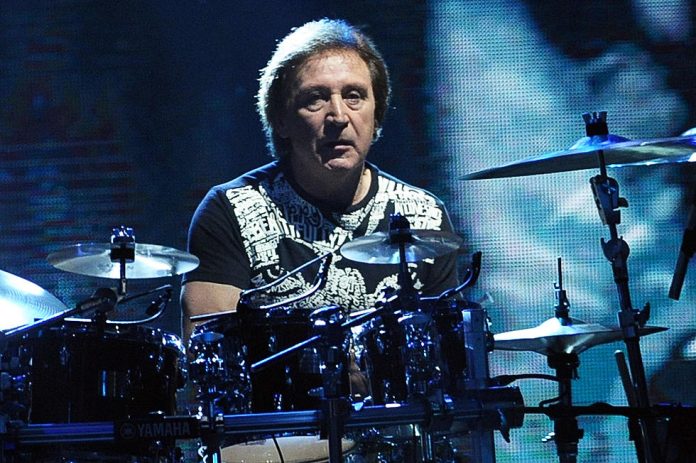HIT CHANNEL EXCLUSIVE INTERVIEW: November 2020. We had the great honour to talk with a legendary musician: Kenney Jones. He is best known as drummer and founding member of the Small Faces and Faces. He joined The Who after the death of Keith Moon in 1978. He has also played with The Law (featuring Paul Rodgers), the Rolling Stones, Paul McCartney, Status Quo, John Lodge and others. Since 2001, he is playing with his own band, The Jones Gang, releasing the studio album “Any Day Now” in 2005. In 2018, he released his critically acclaimed memoir, “Let the Good Times Roll: My Life in Small Faces, Faces, and The Who”. Read below the very interesting things he told us:
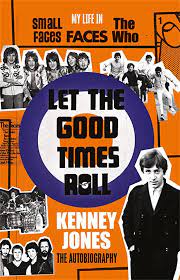 Are you satisfied with the response you got for your memoir, “Let the Good Times Roll”?
Are you satisfied with the response you got for your memoir, “Let the Good Times Roll”?
I enjoyed the book. The book was put together nicely. I didn’t rush it. All I did was a terrible thrill. I am so pleased that so many people liked the book.
Did you have trouble recalling all these impressive details and dates about The Small Faces in your book “Let the Good Time Roll”?
I had a researcher that worked with me, David, and he is a really good guy. I mean, I couldn’t remember some of the dates, the actual dates or where we were playing at certain times. So, that needed a lot of research to find the actual dates.
What are the latest news from The Jones Gang?
Oh, The Jones Gang! We get together and we play as much as we can. In these difficult times when we are in lockdown, with the virus around… I mean, we had all these gigs booked again, because the original ones were dropped and have actually been cancelled or delayed. We get together now once every two weeks and we play together, just to keep our hand in.
What made you to form your own band, The Jones Gang and release the studio album “Any Day Now” in 2005?
I was very fortunate to get together with Rick Willis (ed: Foreigner, Peter Frampton -bass) at the time. He was a good friend of mine and he moved quite close to me. This is going back about 15 years now. So, we formed a band together with Robert Hart (ed: Bad Company -vocals), who loved the idea. Robert Hart and I, wrote some great songs together. We just clicked, we just love playing with each other and we decided to make an album. The album was fun to make, the songs were really good. I was really pleased with the outcome of the songs, because the songs were very meaningful to us. So, making “Any Day Now” was a great achievement and also releasing it in America. We were very lucky to have a #1 single in America with “Angel”, a great song.
 Last year (14 September 2019) Faces reunited for a concert for The Prostate Project. How emotional was it for you?
Last year (14 September 2019) Faces reunited for a concert for The Prostate Project. How emotional was it for you?
It was a great deal of fun because every time we get together and play together, we just have a ball. Nothing has changed in the Faces. I mean, the line up has changed: There are two of us that are no longer here. Ronnie Lane (bass) and Ian McLagan (keyboards), they are no longer with us. We missed them, you know, we think about them when we are on stage playing together. We had a great deal of fun. It was a good occasion raising money for prostate cancer. So yes, we did. We raised about £200.000 for the charity which is a lot a money. Recently, we got together to do the Brit Awards in London at the O2. We played “Stay With Me” with the Royal Philharmonic Orchestra and that was really exciting. It was lovely.
When you recorded “Ogdens’ Nut Gone Flake” (1968) with Small Faces did you realise that you created an excellent album?
It was fun and exciting to make and I knew straight away while we were making it that this is lovely and actually a breakthrough. It was a pleasure to be able to perform on this kind of album. I could tell by the way all these persons played. I just loved the things that are on this album. Playing drums was obvious on “Ogdens’ Nut Gone Flake”, so I’m very happy with that.
“Tin Soldier” (1967) was a big hit for Small Faces and has been covered by many artists (Todd Rundgren , The Guess Who, Paul Weller, Scorpions, Transatlantic). Would you like to tell us a few words about this great song?
“Tin Soldier” is one of my favourite songs, because basically it shows up the spirit of the Small Faces and the way we played together. It reminds me of “Here Come the Nice”, as well. Very similar song.
 You have said that the Small Faces weren’t only experimenting with music, but with clothes, as well. Was image a big part to Small Faces’ career?
You have said that the Small Faces weren’t only experimenting with music, but with clothes, as well. Was image a big part to Small Faces’ career?
We became mods because we couldn’t stick to a style. We just loved to dress up and try different things. Yes, music and fashion were hand in hand and it was a great time to live in the ‘60s London.
In your opinion, did Don Arden (Small Faces manager) help or harmed Small Faces?
A bit of both, I think. Basically, I think he really helped initially because he was a good manager and we got on great. We were feverishly working. He did say: “I was gonna look after our money” and he was looking after our money, for himself really (laughs).
What was the greatest skill that Steve Marriott (Small Faces -vocals, guitar) had?
Two things: his voice and his guitar playing. I cannot believe how much power came out of his voice. He was a very good guitarist as well to play with. He was an excellent guy to play alongside.
 Do you have any memories of the legendary 1968 Australian tour The Small Faces did with The Who?
Do you have any memories of the legendary 1968 Australian tour The Small Faces did with The Who?
Yes, I put it all in my book, “Let the Good Times Roll”. We all enjoyed touring together. The only time that there was a bit of a temper on the tour was when we landed in Sydney. We went straight to a press conference and the Australian press accused us all straight away of taking drugs and doing all kinds of stuff and we did find that offensive and we were really upset.
What is like to be the only surviving member of Small Faces?
I am very proud and honoured to be a member of the Small Faces. I should treasure it forever.
How did Pete Townshend convince you to join The Who?
Basically, we talked for that a couple of hours. I went to their manager’s office and we talked for two hours and he (ed: Pete) said: “You have got to” and I said I couldn’t join The Who, because I had already put a band together with Glyn Johns, our record producer (ed: Small Faces, Faces, Led Zeppelin engineer), and it was a half American and a half English. I said: “Look, I can’t. I have already got a band embarking on. They couldn’t believe it”. I said “No” and then Pete said: “You’ve got to join the band, you are one of us. You are a mod”. I said: “I’m gonna ask my band because they have to be in England tonight and I will let you know what their reaction is”. He said: “Ok, go”. I said to the rest of my band: “I’ve been asked to join The Who” and they all said: “Kenney, you ‘ve got to join The Who. It’s a must. We understand it completely”. So, they were very gracious and that’s how I ended up joining The Who. But I joined The Who on one condition. I said: “I’m not gonna copy Keith Moon. Keith had his own style and I’m not gonna do that. There are certain fills, some things that I would like to do, because I think they are great. I ‘d like to play some of the stuff, but I am not gonna copy him. I’m a completely different drummer”. That’s how I joined The Who.
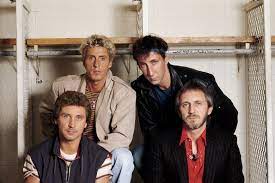 You met Keith Moon the night before he died, watching together the film “The Buddy Holly Story” that Paul McCartney produced. Were you shocked when you learned the news about his death the next morning?
You met Keith Moon the night before he died, watching together the film “The Buddy Holly Story” that Paul McCartney produced. Were you shocked when you learned the news about his death the next morning?
Yes, I was very shocked. I mean, I couldn’t believe that. He said goodnight to me. It must have been 1 o’clock when we both left. I said: “See you, Keith. Nice to see you” and he said: “Yes, Kenney. See you soon”. Then, I went to bed and woke up the next morning, I put the TV on and the news come on and straight away the news said: “Keith Moon has died of a drug overdose”. I thought: “I can’t believe this. He’s playing his practical jokes again”. I wasn’t sure enough if it’s true.
The Who had a lead guitarist and a lead bass player. How difficult was it for you as a drummer to be heard?
It wasn’t difficult as a drummer to be heard because it was like playing with two lead guitarists, one on a bass and one on the other end. It was fun to do because I ended up developing a very fast bass drum foot to keep up with John Entwistle (bass). We worked very well together.
Was it an interesting experience to perform at Live Aid with The Who in 1985?
That was great to do. That was wonderful because it was for a good cause. It was a great experience. The only tragedy was that we only played for 20 minutes, so every band had a 20-minute show. They had traffic lights on stage facing the band. They were all green and then suddenly they had become red and we had to stop. They said: “If you go over that, we are gonna pull the plug”. It was a quite amazing statement. So, anyway, we went slowly out (laughs). But, on the other hand, we had a great time.
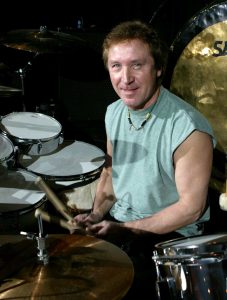 Did you have fun doing the ARMS concerts in 1983 with Eric Clapton, Jimmy Page, Jeff Beck and others?
Did you have fun doing the ARMS concerts in 1983 with Eric Clapton, Jimmy Page, Jeff Beck and others?
Yes, I really enjoyed that, it was a great thing to do. Working with Jimmy Page, Jeff Beck, Eric Clapton, Stevie Winwood, Joe Cocker, Bill Wyman (Rolling Stones) on bass, Chris Stainton (Eric Clapton, Spooky Tooth) and James Hooker (Steve Winwood) on keyboards. I will leave out some people… In the United States, we had Paul Rodgers (Free, Bad Company) singing as well. Yes, it was fun to do.
How did you get to record “It’s Only Rock ‘n’ Roll (But I Like It)” with Rolling Stones in 1973?
Ronnie Wood lived on Richmond Park. I don’t know if everybody knows it; Richmond Park it is a park just outside London in Richmond. I lived near to one of the gates and so did Ronnie Wood. At night, they closed the gates, so the park was closed. Ronnie had built a studio in his basement and every other night he ‘d wait until I get one foot into bed. He would call and he would say: “Kenney, we haven’t got a drummer”. So I would say: “Alright Ronnie, I’ll be around soon”. So, I had to drive until the end of the park and I had to go really carefully because I liked to drink. So, it was nerve-racking. I would get there and one night Bob Dylan played there, another night David Bowie. Eric Clapton was there and we were all just jamming together, as well. This night I went there because he called again and it was Mick Jagger. So, Mick and I, we were just playing together in the studio. Ronnie Wood had just bought a lot of outboard recording equipment and he was in the control room, because we didn’t have an engineer. Ronnie was doing a bit of both (ed: being in the control room and playing bass). So, most of the time, Mick (ed: on guitar) and I were in the studio, alone together and we were just playing this riff. After a while -because it was quite late, about 2 or 3 in the morning- I said: “Mick, play this nice line while I am playing along. Anyway, it’s only rock ‘n’ roll” and he said: “But I like it”. So, he started playing this riff, “It’s Only Rock ‘n’ Roll (But I Like It)”. That’s how it happened.
Who are your influences as a drummer?
In the very early days, it was Buddy Rich, Joe Morello and an English drummer called Kenny Clare. They were all fantastic drummers and they all played jazz and were great to watch. I had actually seen Joe Morello playing live. Also, Brian Bennett from the Shadows is a big influence on me. All from the Shadows are great. We have Bobby Elliott from The Hollies. I love these drummers, as well. And Al Jackson from Booker T. and the M.G.’s.
 Do you consider your collaboration with Paul Rodgers (Free, Bad Company -vocals) in The Law as a successful one?
Do you consider your collaboration with Paul Rodgers (Free, Bad Company -vocals) in The Law as a successful one?
I think it was very successful because basically we had a chance to work together. We made two great albums: One we released (ed: “The Law” -1991) and the other one we didn’t release. We are thinking about releasing it soon. We both love it more than the one that was released.
I guess that you spend a lot of time at your Hurtwood Park Polo Club. Does it distract you from creating more music?
No, it’s completely the opposite. It makes me make more music because we have a studio and we would get up and make a bunch of songs. We have a music license for years and years. We do outdoor gigs, festivals and fairs and so we are very lucky to be able to perform and play music and there are a lot of other bands there, too. Also, the Faces have played there with me and The Who have played there with me. A lot of other famous people have played there over the years.
What was it like to play polo with Ginger Baker (Cream -drums)?
Ginger was the only one who could play polo and ride at the same time. At least, I could ride when he was letting me to play polo. So, when I was ready to hit the ball, Ginger was going to ride and hit the balls and after a few rounds, he was exhausted. It’s a sport you can’t hold on. We both loved it and we never looked back. It’s a great sport.
 Did you have a good time recording John Lodge’s “Natural Avenue” (1977) album? You even played on his video for “Street Café”!
Did you have a good time recording John Lodge’s “Natural Avenue” (1977) album? You even played on his video for “Street Café”!
Yes, I did. John is a very good and close friend on mine. I remember it, I think it was in 1976 in the studio. It was a very hot summer day. I mean, it was one of the hottest days in the year and we were stuck in the studio on that day, for about three weeks in total. I remember it just was being really hot. It was great working with John. John is always fun and he’s a great guy. He had written some great songs and I had to play the drums. I thought it was great. I can’t remember the video. I haven’t seen the video for years.
In your book, you write that you were not a big fan of Humble Pie (featuring Steve Marriott). Would you like like to explain it to us?
I liked everybody in Humble Pie. I never really knew their music that well because I was too busy in the Faces, at the same time as Steve was busy touring with Humble Pie. Of course, we met in one festival and I just said “hello” to Steve and we had a great time chatting to each other. There wasn’t an argument, just our paths never crossed.
Do you think popular music which was written in the ‘60s and ‘70s is better than today’s music?
I think to be honest, the ‘60s and the ‘70s music, even the ‘50s music, is lost forever. It was an influential time and that’s the kind of music that was made at the time. There’s some music that I like today and some that I don’t. I mean, I’m not really into rap music. There is some good rap music and same that I just can’t stand. I don’t want to say that I don’t like music, but as long as it’s always fun, I like music. It’s the story of the times, really.
 How did it happen to perform “Red Sky” with Status Quo on Top of the Pops in 1986?
How did it happen to perform “Red Sky” with Status Quo on Top of the Pops in 1986?
I got a call from Quo because they have always been longtime friends of mine. Francis (ed: Rossi -guitar, vocals) and Rick (ed: Parfitt -guitar, vocals) called me up and said: “We are going to do Top of the Pops. Our drummer (ed: Jeff Rich) is stuck somewhere else in Britain”. I said: “Yes, no problem”. I did it and it was a pleasure to do.
By the way, there’s a great backstage photo of you after the Status Quo “farewell” concert at Selhurst Park in 1984 with Status Quo, John Entwistle, Rick Wakeman, Roger Taylor and Lemmy. Do you have any memories of that night?
No, I cant’ remember that. I try to remember the photograph. Yes, I’ve seen the photograph a long time ago… I still can’t remember it (laughs).
Could you describe to us the recording sessions for Paul McCartney’s “Rockestra Theme” (1978) single? There was a fantastic line-up there!
It was myself and John Bonham on drums, along with Wings drummer (ed: Steve Holley). It was great. We were in EMI studios, in Abbey Road and it was a great experience. Paul has always been a good friend and I enjoyed playing with that many people there. Hank Marvin (ed: The Shadows) was on the session as well and he is one of my heroes on guitar. John Bonham and I, got on really well. Zeppelin and Faces toured America and we bumped into each other quite a lot in New York. John and I, we ‘d go often to one of our favourite places to have a drink, which was an English pub, because he liked Watney’s Red Barrel. John used to like pints of it. I could never drink so many pints of beer, but he did.
There was an underrated mod band called The Creation and Ronnie Wood (Faces, Rolling Stones -guitar, Jeff Beck Group -bass) joined them for some time as a lead vocalist and guitarist. Did you like The Creation, particularly their original guitarist, Eddie Phillips?
Yes, I liked The Creation, they were a great mod band. I am gonna play some of their records later because I just want to live it again. They were great. Good band.
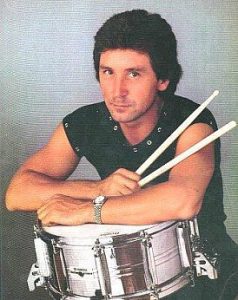 There is a story in your book about David Jones, who later became David Bowie, and Small Faces. Would you like to share it with us?
There is a story in your book about David Jones, who later became David Bowie, and Small Faces. Would you like to share it with us?
We became friends before we were known. We used to drink in Denmark Street in a little café called La Gioconda. So, we used to meet there, chatting and swapping records. One day, we would play a gig locally in East London (ed: Romford) and he said: “Can I come up and play with your band?” We said: “Yes, no problem. But you ‘ve got to help us pack the van up and unload the van when we finish”. He came on stage and sang. He was actually a Small Face. A fifth member of the band, really.
Do you have any regrets in your career?
Yes, I do have regrets. I had sad times when Keith died and The Who concert in Cincinnati (ed: when 11 fans died on 3 December 1979). That was tragic.
A huge “THANK YOU” to Mr. Kenney Jones for his time. I would also like to thank Casey Jones for her valuable help.
Official Kenney Jones website: https://kenneyjones.com
Official Kenney Jones Facebook page: https://www.facebook.com/kenneyjonesdrums
Hurtwood Park Polo Club website: http://www.hurtwoodparkpolo.co.uk/


